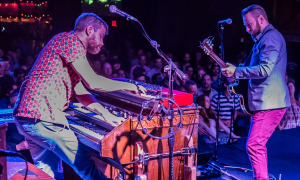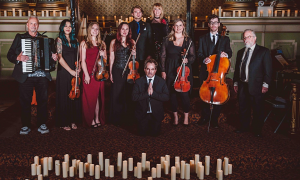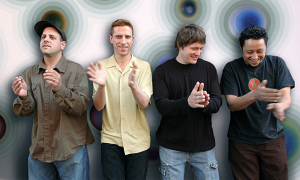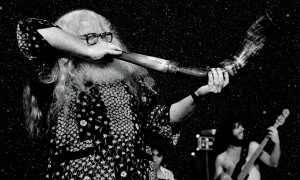Home » Jazz Articles » From the Inside Out » Mama Africa
Mama Africa
Or you could sit back right where you're at and read this instead.
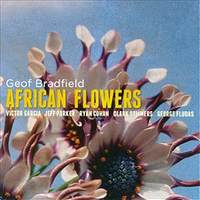 Geof Bradfield
Geof BradfieldAfrican Flowers
Origin Records
2010
African Flowers germinated during reed player Geof Bradfield's 2008 performance tour of Africa, co-sponsored by the US State Department and Jazz at Lincoln Center, as part of pianist Ryan Cohan's quartet. No stranger to the music of Africa, multi-instrumentalist Bradfield (tenor and soprano sax, bass clarinet and flute) arranged singer Miriam Makeba's "Polo Mze" for Seize the Time (Naim Jazz, 2009) by drummer Ted Sirota's Rebel Souls, an ensemble with whom Bradfield has frequently performed in their shared Chicago hometown.
Created through support from Chamber Music America's New Works: Creation & Presentation Program, Bradfield's third release comprises a suite of nine main tunes inspired by the music of Uganda, Kenya, Tanzania and the Congo, connected through solo piano, drum, bass and ensemble interludes. "All the pieces use motifs from other pieces," Bradfield explains. "There's no piece that stands alone, that isn't in some way connected to another."
"With African Flowers, I hope to communicate to the listener the expansive spirit and deep soulfulness I experienced as a traveler in Africa."
"Butare" is based on a praise song from Rwanda but grows from New Orleans roots, as its opens with syncopated horn lines that part to allow light to reach its African and jazz rhythmic undergrowth. Because saxophone and trumpet also lead "Nairobi Transit," you catch echoes of the be-bop quintet structure and sound, but their scalding duet expands far beyond bop. "Transit" propels you to the splashing rhythm of "The Nurse from Nairobi," ornamented by guitar and piano solos. "Mama Yemo," the leader's spotlight, serves up a more traditional acoustic jazz ballad sound.
"Lubumbashi" introduces a third continent—South America—by grooving Cuban son into Congolese rumba from Victor Garcia's saucy and hot trumpet solo, to Jeff Parker's electric guitar that threads in and out of the rhythm as sharp and bright as a needle, to George Fludas' slamming funk drums behind Parker's solo, all shimmering in an arrangement that amazingly feels like jazz, Latin jazz and African jazz.
"Harare/Leaving Africa," the finale, roams a broad and verdant vision. Bradfield's sax and Garcia's trumpet jump from chord to chord, with Parker's guitar chirping like a bird on a companion flight. It seems wonderfully fitting that Bradfield's tribute to Africa should conclude with a tune that features such an expansive and expressive drum solo, and that the first instrument to come dancing out from the tumult of its aftermath is Parker's riffing rhythm guitar.
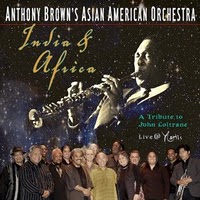 Anthony Brown's Asian American Orchestra
Anthony Brown's Asian American OrchestraIndia & Africa: A Tribute to John Coltrane Live at Yoshi's
Water Baby Records
2010
India & Africa offers a surprisingly accessible performance tribute to some of saxophonist John Coltrane's most knotty and deeply spiritual music, a tribute wondrously heavy on drums and percussion, beginning with orchestra leader Anthony Brown. Taken into standalone context like this, Coltrane's exploratory jazz probes into the music of India and Africa—including "India," "Africa," "Liberia" and "Afro Blue"—construct an impressive chapter in the saxophonist's considerable body of work.
"Although Coltrane was influenced by music globally when he recorded 'India' and 'Africa,' he did not incorporate instruments from those cultures," Brown explains. "The Asian American Orchestra has extrapolated Coltrane's original vision by including Indian and African traditional instruments into these masterworks."
Passage to India begins from a reflective "Living Space," an opening drone with flutes and other wind instruments that seem to float in....umm, living space, and points the direction for the orchestra's journey to follow. "India" moves powerfully and slowly, like a continent. The pace quickens in the indigenous duet between tabla (Dana Pandy) and sarod (Steve Oda), which alternates unison with call and response passages; the stereo separation in these response passages, when their riffing bounces back and forth between your speakers or headphones, is extremely cool. When saxophonist Masura Koga leads the ensemble back in to reprise "India," the ensemble (and appreciative audience) erupts into audible joy—the genuine spiritual connection of collective creation.
Bridging these two continents, "Exaltation" begins as an African chant with matching percussion. But the chant turns, when landing upon the word "grace," into a rough-hewn version of the Christian traditional "Amazing Grace." This opens up passage to "Africa," where Koga blows impressive tenor fire to honor history's most famous saxophone flamethrower. "Africa" leads to "Liberia," where pianist Glen Pearson anchors saxophonist Melicio Magdaluyo's exploratory, explosive tenor, while the orchestra's percussion lines multiply like chattering rabbits all around them. "Liberia" maps out this journey's most Coltrane-like jazz stop.
Brown has previously honored the works of Duke Ellington, Thelonious Monk, George Gershwin and Charles Mingus with his orchestra, and collaborated with drummer Max Roach, pianist Cecil Taylor, pianist Anthony Davis and other jazz giants. In the 1990s, Brown served as Curator of American Musical Culture for the Smithsonian Institution.
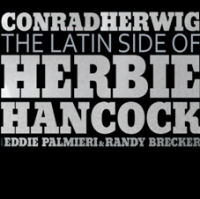 Conrad Herwig
Conrad HerwigThe Latin Side of Herbie Hancock
HalfNote Records
2010
Trombonist and bandleader Conrad Herwig has quite colorfully and majestically explored the Latin side of some of modern music's most enduring composers and performers, and herewith adds his survey of Herbie Hancock's compositional catalog to previous Latin sets that honored Miles Davis and Wayne Shorter. "It's a little daunting in the sense that these tunes are so iconic," Herwig admits. "I grew up idolizing Herbie's music. His tunes became the new standards for a whole generation of post-Coltrane players."
To navigate this territory, recorded in performance at the Blue Note in NYC, Herwig turned to two old friends: Trumpeter Randy Brecker, who first played with Herwig three decades ago; and pianist Eddie Palmieri, one of Latin jazz's reigning piano masters and one of Herwig's Latin jazz advisors for more than two decades. He also brought one new friend onboard: pianist Bill O'Connell, a veteran of classic sessions by Mongo Santamaria, Jerry Gonzalez, and others. O'Connell and Herwig either split or shared all these Latin Hancock arrangements.
Brecker's trumpet burns through the group's collective descarga on "The Sorcerer" like a flame through tissue paper, while O'Connell takes charge with a powerful improvised passage that refracts Hancock's original tune into shards of melodic light. Brecker's and Herwig's intertwined improvisational passages only send these shards flying higher and brighter.
But Herwig's closing trilogy, a howling ensemble hurricane, is simply as good as Latin jazz gets. O'Connell's arrangement strings tethers the familiar "Maiden Voyage" melody to soft horns that float in harmonic space, the shadow of a passing cloud that gently darkens the rhythm section's roiling sea, with Craig Handy on flute, Brecker on trumpet so soft that your ears hear flugelhorn, and O'Connell on piano, painting brilliant solo strokes. More than a beautiful rendition, "Maiden Voyage" rediscovers this jazz classic.
Palmieri jumps back in to help fire the remainder back up to a torrid Latin boil. Latin rhythms illuminate the sweet funky insides of "Cantaloupe Island," which, after Palmieri's two-fisted piano excursion, culminates in a blazing percussion/horn breakdown; with no piano or bass to anchor them to the percussion rhythms, Handy, Brecker and Herwig are left free to scatter and soar skyward like untethered birds. In a torrent, "Watermelon Man" pours out from the aftermath of "Cantaloupe," highlighted by Palmieri's spirited dialogue with the rhythm and percussion instruments.
Even on just the strength of these last three tunes, Herwig's Latin Hancock presents tremendously rewarding, eye-opening and ear-popping, new interpretations of classic jazz pieces.
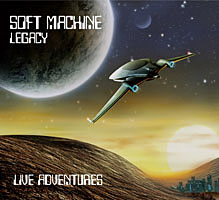 Soft Machine Legacy
Soft Machine LegacyLive Adventures
MoonJune Records
2010
Many have found elements of jazz in the music of European progressive rock artists such as Gong, Can, King Crimson and even, to a certain improvisational extent, Yes. Soft Machine Legacy continues this...umm, legacy with an amoeba-like lineup (mostly) from alumni of the original progressive instrumental group Soft Machine: guitarist John Etheridge, bassist Roy Babbington and drummer John Marshall, joined by like-minded improviser and former Gong member Theo Travis on saxophones and flute.
Recorded in Austria and Germany during Soft Machine Legacy's 2009 European tour, Live Adventures sings the rare instrumental jazz-rock song that doesn't seem to cry out for vocals: unspoken and invisible connections between these musicians say plenty enough. "The Nodder" may be based on an electric guitar melody doubled by bass with contrapuntal saxophone, but it's Marshall who keeps this "Nodder" moving: he swirls snare and cymbal pulses into dizzying rhythmic pools and waves that don't move straight ahead in any definite direction but concentrically ripple out, then back, and emerge more loud and aggressive as Travis' improvisation grows more strident and free.
But most of these Adventures are charted by guitarist Etheridge and saxman/flutist Travis. Travis shows his free jazz saxophone bent in the more knotty passages of "Grapehound," and unwraps from "Gesoreut" futuristic Rahsaan Roland Kirk and electrified Eddie Harris sounds that seem to echo back from a distant planet. His flute layers simple, gorgeous cover for Etheridge's profoundly beautiful insight into the blues-based ballad "Song of Aeolus," and their dual lead lines supercharge the fusion "In the Back Room," with Etheridge harmonizing in twisting psychedelic colors and chopping out blocks of funk. "The Relegation of Pluto/Transit" is an amplified, "let's all play at the same time," intellect-cleansing freakout.
Live Adventures is dedicated to two deceased Soft Machine bandmates, saxophonist Elton Dean and bassist Hugh Hopper. Hopper's legacy is reprised in this live set by a colorful abstraction of his composition "Facelift" that somehow floats apart into separate, simultaneous guitar and saxophone passages and yet remains together. The dawn of "The Last Day" grows out of its ending, an organic hypnotic jazz-rock jam that swells and then fades into silent nothing.
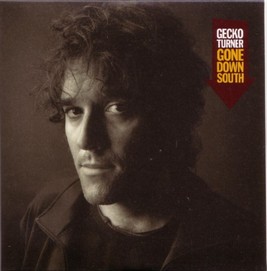 Gecko Turner
Gecko TurnerGone Down South
Lovemonk Records
2010
Gecko Turner is a globe-trotting Spanish musician and singer with a particular sweet spot for all the different aspects of American R&B and soul. While composing, arranging, and performing (on guitar, keyboards, percussion and more), Turner demonstrates a light and natural touch for mixing different soul and R&B styles—mostly from the US, but some from Latin and South America—together into organically creative new combinations. While singing, Turner rarely raises his throaty, husky yet light voice, and often purrs and meows as much as he sings, overpowering with subtlety. It's easy to suspect that he's also a master maestro with the ladies.
Recorded at various stops in California, Texas, London, Madrid and Extremadura, the uproariously lascivious and funky Gone Down South consolidates and advances Turner's intercontinental soul. Slippery and sparkly, "Tea Time" dances on Latin and American and African rhythms loosely strung together by an electric eel of rhythm guitar and a funk bass line (and also features a rapper from Extremadura, Isayah Thomas). Then this coolly refreshing "Tea Time" pours into the scalding "Amame, Mimame," where a single piano chord pounds out liberating, two-fisted soul that rocks in tandem with blues harmonica, Afro-Cuban percussion and a Dionysian African chorus that just won't stop chanting its title. On top of all this instrumental heat, Turner's laconic and drawling vocal sounds even cooler.
"Holly Hollywood" would be the song for radio, consolidating everything that's good about Turner's cosmopolitan soul into a single tune: Leon Thomas' shimmering Caribbean steel pans reflect off hip-hop beats and Carter Arrington's cat-quick guitar, and drummer Brannen Temple and bassist Yoggie Musgrove rock with implacable funk, while Turner's vocal prowls the soundscape in search of satiating carnal appetites.
"The Love Monk" digitally paints a more modern club soundtrack, cutting beats and horn solos in and out of its thick and steamy electronic jungle mix, and jumps quickly into "When I Woke Up," which skates along icy clavinet and frosty trumpet. When you hear Turner deliver the line, "Baby can't you see that/I love you like a child," you can't help but be charmed. Marvin Gaye got away with such ridiculous and playful sensuality but precious few others have, which is pretty cool for a still-growing R&B singer from Spain. (Damn if that rhythm guitar doesn't sound lifted from Gaye's party epic "Got to Give It Up," too.)
"Being born in Spain, it's funny that I feel American soul music so deeply," Turner says. It's more fortunate than funny for those folks listening.
 Various Artists
Various ArtistsThe Roots of Chicha Volume 2: Psychedelic Cumbias from Peru
Barbes Records
2010
The modern tradition of cumbia music in Peru goes back to the 1960s. But in the 1970s, cumbia began to be known as "chicha," the name for an alcoholic drink of which the Incas were famously fond, and cumbia and chicha both somehow became associated with the poor and downtrodden living in Peruvian slums—ghetto music.
Following up Barbes' 2007 release The Roots of Chicha Volume 1, Volume 2 delivers chicha from Los Destellos' founder and guitarist Enrique Delgado, guitarist Roberto "Manzanita" Hernandez, Chacalon y la Nueva Crema (named to honor British blues-rock supergroup Cream by leader Lorenzo Palacios, "The Pharoah of Chicha") and other founders. "Volume two focuses more on the urban aspect of the music and less on the Amazonian side," suggests project compiler and producer Olivier Conan.
Just like the cresting and crashing guitar sound of Dick Dale and other practitioners defined 1960s surf rock, chicha roots in and grows out from its thin and wiry, trebly electric guitar sound. Los Illusionistas' "Colegiala" was a popular cumbia single, awash in mysterious whiffs from the Middle East and the Caribbean that arise from its simple melody. Los Illusionistas were based on the proven model of Los Destellos, whose "Cumbia del Desierto" ("Cumbia Desert") suggests a guitar band and a Latin percussion ensemble marching—no, dancing—together in a parade through downtown Cairo. Enrique Delgado and Fernando Quiroz swap funky old fuzztone guitar in "Constelacion," which opens this collection.
Los Walkers, specialists in music from Peru and Cuba, electrify Cuban composer Ernesto Lecuona's standard "Siboney" with that special sonic blend of surf guitar, rock guitar and Peruvian and Cuban influences—the sound of The Adventures in Jazz Orchestra jamming with Mongo Santamaria—that most folks know as cumbia.
Guitarist Manzanita and his percussionists (Manzanita y su Conjunto) absolutely kill "El Hueleguiso" and "Agua," the most dynamic and Latin-sounding of all these tunes. While guitar and organ jam through these tight little melodies, timbales and percussion swarm over and submerge them like an army of hungry ants—stone cold groovy psychedelic cumbia.
Even if some of this music did not age so well, most of this spirit did.

Max Wild
Tamba
ObliqSound
2010
Alto saxophonist Max Wild's Tamba, his ObliqSound debut, combines classic musical themes and devices from Zimbabwe and South Africa with illuminating arrangements and improvisations from contemporary jazz. "My connection to Zimbabwean music defines me. Once I stopped trying to sound like a 'jazz' musician and let my inspiration come out freely, I was able to let my diverse influences create something that was personal to me. My music," Wild once reflected. "It's up to the critics what they want to call it."
Wild does not often spotlight himself or his solo prowess; vocals and guitar from Sam Mtukudzi, Wild's primary co-composer (and son of Zimbabwean musical legend Oliver Mtukudzi), play just as important a role as Wild's alto in this sound. Wild relies instead on your "greater than its parts" communal experience of his entire ensemble, an essential attribute of much African music. That ensemble includes electric bassist Michael Olatuja, whose wife Alicia contributes vocals; so does South African vocal star Chiwoniso.
A most challenging excursion, Tamba's title track stands among Wild's favorites. The rhythm section smoothly shifts between at least three different contemporary jazz and rock grooves, and yet provides solid rhythmic foundation for the skyrocketing electric guitar and electric piano solos before Wild's final solo burns this tune to the ground. The contemporary Afro-jazz-pop fusion of the title track seems aligned with the sound of Johnny Clegg & Savuka, one of South Africa's pioneering integrated jazz-pop ensembles. From another perspective, "Ndakuvara" creeps open with a Motown bass line and straight-ahead drums, and sounds like a newly discovered Junior Walker & the All Stars tune where vocals sing the verses but Wild's alto torches the instrumental break.
"Rudo Rwako" begins with an African vocal chorus, reverential yet lively, that's almost gospel in sound and definitely gospel in spirit. Next comes "Kuvakidzana," a title which proves surprisingly easy to sing and Tamba's only tune to open in the delightful and thoughtful clatter of African percussion; Wild's alto sings so sweetly that it sounds more like Grover Washington Jr.'s soprano (more specifically, "Just the Two of Us"). The journey "In Your World" begins with Wild's multi-tracked recorders, the third consecutive tune to open with completely different instrumentation.
In Shona, the predominant language of Zimbabwe, where Wild grew up, "Tamba" means "dance," and much of Tamba dances. Though it has a happy title, and sounds quite joyous, for Wild it must also ache with bittersweet: Sam Mtukudzi was killed at age 21 in a car accident while this set was being assembled for production.
Tracks and Personnel
African Flowers
Tracks: Butare; Piano Solo; The Children's Room; Lubumbashi; Mama Yemo; Drum Solo; Nairobi Transit; Prelude; Kampala; Bass Solo; The Nurse from Nairobi; Harare/Leaving Africa.
Personnel: Geof Bradfield: Tenor saxophone, soprano saxophone, bass clarinet, flute; Victor Garcia: trumpet, flugelhorn, congas, percussion; Jeff Parker: guitar; Ryan Cohan: piano; Clark Sommers: bass; George Fludas: drums, percussion.
India & Africa: A Tribute to John Coltrane Live at Yoshi's
Tracks: Living Space; India; Ole; Tabla-Sarod Duet; India-Reprise; Exaltation; Africa; Liberia; Percussion Discussion; Dahomey Dance; Africa-Reprise; Afro Blue.
Personnel: Anthony Brown: drum set, percussion, conductor; Danny Bittker: baritone saxophone, contralto clarinet, soprano saxophone; Mark Izu: bass, Chinese mouth organ; Henry Hung: trumpet, flugelhorn; Masaru Koga: soprano saxophone, tenor saxophone, Japanese bamboo flute; Richard Lee: bass trombone; Melecio Magdaluyo: alto saxophone, tenor saxophone, soprano saxophone; Marcia Miget: flute, alto saxophone, tenor saxophone, soprano saxophone; Kenneth Nash: African, America, and Indian percussion; Pushpa Oda: tambura; Steve Oda: sarod; Dana Pandey: tabla; Glen Pearson: piano; Geechi Taylor: trumpet, flugelhorn; Kathleen Torres: French horn; Wayne Wallace: trombone.
The Latin Side of Herbie Hancock
Tracks: Oliloqui Valley; One Finger Snap; Butterfly; The Sorcerer; Actual Proof; Maiden Voyage; Cantaloupe Island; Watermelon Man.
Personnel: Conrad Herwig: trombone; Craig Handy: saxophones, flute, bass clarinet; Mike Rodriguez: trumpet; Bill O'Connell: piano; Ruben Rodriguez: bass; Robby Ameen: drums; Pedro Martinez: percussion; Eddie Palmieri: piano; Randy Brecker: trumpet.
Live Adventures
Tracks: Has Riff II; Grapehound; The Nodder; In the Back Room; Song of Aeolus; The Relegation of Pluto/Transit; Gesolreut; Facelift; The Last Day.
Personnel: John Etheridge: guitar; Theo Travis: saxophones, flute; Roy Babbington: bass; John Marshall: drums.
Gone Down South
Track listing: Truly; Cuanta Suerte; So Sweet; Tea Time; Amame, Mimame; You Can't Own Me; Mbira Bira; Holly Hollywood; Let's Say Tonight; The Love Monk; When I Work Up; Gone Down South.
Personnel: Gecko Turner: vocals, piano, guitar, drums, percussion, tambourine, keyboards, Spanish guitar; Irapoan Freire: trumpet; Kike Eizaguirre: bass; Javi Mojave: homemade mini rhumba-box, percussion, mbira; Juanjo Frontela: drums; Yelsy Heredia: upright bass; Javier "Caramelo" Masso: piano; Sera Hurtado: percussion; Gene Garcia: backing vocals; Nuria Cuadrado: vocals; Alvaro "Dr. Robelto" Fdez: Fender bass, mbiras; Akin Onasanya: drums; Julian Maeso: Hammond B-3 organ; Miguel Zamora: Spanish guitar, guitar, backing vocals; Isayah Thomas: vocals, backing vocals; Rogerio De Sousa: marimba, talking drum; Yolanda Avomo: backing vocals; Piruchi Apo: vocals, backing vocals; Carter Arrington: guitar; Yoggie Musgrove: bass; Brannen Temple: drums; Leon "Foster" Thomas: steel pan; Sonny Levine: programming; Michael Ramos: clavinet.
The Roots of Chicha 2: Psychedelic Cumbias from Peru
Tracks: Constelacion; El Diablo; Silbando; Colegiala; La Pastorcita; Lamento del Yacuruna; Como Un Ave; El Hueleguiso; A Trabajar; Cumbia del Desierto; Mala Mujer; Agua; El Aguajal; Paga la Cuenta Sinverguenza; Siboney; La Danza del Petrolero.
Personnel: Los Destellos; Company Quinto; Los Riberenos; Los Illusionistas; Los Destellos; Los Wembler's de Iquitos; Grupo Celeste; Manzanita y su Conjunto; Chacalon y la Nueva Crema; Los Destellos; Ranil y su Conjunto; Manzanita y su Conjunto; Los Shapis; Manzanita y su Conjunto; Los Walkers; Los Wembler's de Iquitos.
Tamba
Tracks: Kwatinobva; Tinomutenda; Tamba; Rudo Rwako; Kuvakidzana; In Your World; Odun De; Ndakuvara; Butterfly; Voice.
Personnel: Max Wild: alto saxophone, recorders; Sam Mtukudzi: lead vocals, backing vocals, acoustic guitar, percussion; Chiwonisa: lead vocals, backing vocals; Alicia Olatuja: lead vocals, backing vocals, voices; Soren Moller: piano, keyboards; Jesse Lewis: lead guitar; Michael Olatuja: electric bass; Massimo Biolcati: acoustic bass; Obed Calvaire: drums, udu; Sam Felo: backing vocals, percussion; Chris Berry: mbira, congas.
< Previous
Denise Donatelli: Songbird With A Gr...
Next >
Mystery of the Guitar
Comments
Tags
From the Inside Out
Chris M. Slawecki
United States
Geof Bradfield
Ryan Cohan
Miriam Makeba
Ted Sirota
Jeff Parker
George Fludas
John Coltrane
Anthony Brown
Glen Pearson
duke ellington
Thelonious Monk
George Gershwin
Charles Mingus
Max Roach
Cecil Taylor
Anthony Davis
Conrad Herwig
Herbie Hancock
Miles Davis
Wayne Shorter
randy brecker
Eddie Palmieri
Bill O'Connell
Mongo Santamaria
Jerry Gonzalez & The Fort Apache Band
Craig Handy
Gong
Yes
Soft Machine
John Etheridge
Roy Babbington
John Marshall
Theo Travis
Rahsaan Roland Kirk
Eddie Harris
Elton Dean
Hugh Hopper
Gecko Turner
Leon Thomas
Carter Arrington
Brannen Temple
Cream
The Ventures
Max Wild
Oliver Mtukudzi
Michael Olatuja
Junior Walker
For the Love of Jazz
 All About Jazz has been a pillar of jazz since 1995, championing it as an art form and, more importantly, supporting the musicians who create it. Our enduring commitment has made "AAJ" one of the most culturally important websites of its kind, read by hundreds of thousands of fans, musicians and industry figures every month.
All About Jazz has been a pillar of jazz since 1995, championing it as an art form and, more importantly, supporting the musicians who create it. Our enduring commitment has made "AAJ" one of the most culturally important websites of its kind, read by hundreds of thousands of fans, musicians and industry figures every month.





